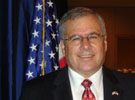
With challenges such as countrywide elections, border demarcation, and a self-determination referendum in the South looming, Sudan faces a daunting list of to-dos in the final 19 months of the peace process laid out in the Comprehensive Peace Agreement, or CPA. It was in this context that U.S. Special Envoy to Sudan General Scott Gration opened the Forum for the Supporters of the CPA today in Washington.
Although much progress has been made in the last four and a half years, critical provisions of the CPA remain uncompleted. (…) We must work together urgently to set the foundation for a future of peace and security in Sudan. The U.S. cannot do it alone. All of this will depend once again on your efforts, on the commitment and engagement of the international community.
Thirty-three countries and organizations took part in today’s forum, which comes on heels of four days of closed door negotiations between the United States and the two primary delegations from Sudan: the National Congress Party (NCP) from the North and the Sudan People’s Liberation Movement (SPLM) from the South. The conference today brought together other key international actors whose involvement is critical to re-starting implementation of the CPA, including the Arab League, China, the United Nations, regional governments, and members of the Sudan Troika (the UK, Norway, and the U.S.).
The first part of the morning session, the segment open to the press, included a keynote address by Lazarus Sumbeiywo, who served as the chief negotiator at the Naivasha conference in 2005 that resulted in the CPA, and brief remarks by Deputy Secretary of State Jim Steinberg, who stood in for Secretary Clinton. Both diplomats emphasized the years of work that led to the signing of the CPA and importance of having renewed commitment from the agreement’s signatories and guarantors to implement the remaining provisions. For the remainder of the day, stakeholders convened in small groups to discuss implementation of the CPA with a focus on governance and political development, security enhancement, and economic development.
As Special Envoy Gration noted in comments to the press, the goal of the conference was to:
[R]ekindle among the international community the same passion and effort that was present in 2005 when the accord was negotiated and signed. It’s that kind of passion that we’re going to need to fully implement the CPA and bring it to conclusion over the next 19 months.
In particular, Gration and senior officials highlighted an agreement reached over the weekend with the SPLM and the NCP to accept the upcoming decision by the Permanent Court of Arbitration in The Hague on the border demarcation of contested Abyei province. Both sides have committed to recognize the court’s decision as final and binding and agreed to be on the ground in Abyei when the decision is announced to ensure that violence doesn’t erupt, according to Gration.
That same sentiment may not be on the ground, so we’ve taken a commitment to ensure that we will do everything we can and come up with a plan to ensure a soft landing – from both sides. (…) The international community stands ready to help in any way that we can…
Reflecting on this point and interpreting it as a sign of the administration’s stance toward mediation, Enough senior advisor Omer Ismail expressed reservations. Holding up this commitment to respect the decision on Abyei border demarcation as an example of progress in negotiations suggests that the administration may be falling into the trap set by Khartoum time and again, Ismail indicated.
The government in Khartoum has a time-honored strategy: they create a crisis – such as when they kicked out the aid agencies out of Darfur – and then they win over the international negotiators by agreeing to fix it.
As Ismail explained, this is precisely what is occurring with Abyei. As a provision of the 2005 CPA, the North and the South agreed to set the boundaries of the province. When they failed to come to an agreement, the Abyei Boundary Commission, or ABC, had to step in. That commission issued a final and binding decision that Abyei would be part of the South. When the North rejected this decision, the boundary decision was referred to the Permanent Court of Arbitration.
So now we commend the North for agreeing ahead of time to accept the decision of the Court of Arbitration? This was a key provision of the CPA that the North has fought time and again. During nearly 20 years in power, Bashir and his allies have used this strategy to appease negotiators over and over. It’s an excellent strategy on their part; and with this new U.S. team led by General Gration, it seems to be working again.
A joint communiqué released at the close of the forum outlines an impressive set of commitments from CPA stakeholders, but in light of concerns like those expressed above, immediate questions arise. Where do peace negotiations go from here? Based on these commitments and informal conversations this evening with officials involved in the negotiations, the path forward remains unclear, and the terms for measuring progress undefined.
Photo: U.S. Special Envoy to Sudan Maj. General Scott Gration, courtesy of Mark Leon Goldberg of U.N. Dispatch. Read Mark’s take on the Forum here.

